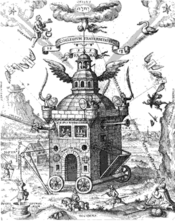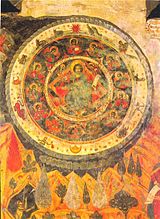- Esoteric Christianity
-
 The Temple of the Rose Cross, Teophilus Schweighardt Constantiens, 1618.
The Temple of the Rose Cross, Teophilus Schweighardt Constantiens, 1618.
 A 17th-century fresco from the Cathedral of Living Pillar in Georgia depicting Jesus within the Zodiac circle
A 17th-century fresco from the Cathedral of Living Pillar in Georgia depicting Jesus within the Zodiac circle
Esoteric Christianity is a term which refers to an ensemble of spiritual currents which regard Christianity as a mystery religion,[1][2] and profess the existence and possession of certain esoteric doctrines or practices,[3][4] hidden from the public but accessible only to a narrow circle of "enlightened", "initiated", or highly educated people.[5][6]
These spiritual currents share some common denominators, such as:
- heterodox or heretical Christian theology;
- the four canonical gospels, various apocalyptic literature, and some New Testament apocrypha as sacred texts; and
- disciplina arcani, a supposed oral tradition from the Twelve Apostles containing esoteric teachings of Jesus the Christ.[7][8]
Contents
Mystery religion
Early Christians used the Greek word μυστήριον (mysterion) to describe the Christian Mystery. The Old Testament versions use the word mysterion as an equivalent to the Hebrew sôd, "secret" (Proverbs 20:19; Judith 2:2; Sirach 22:27; 2 Maccabees 13:21). In the New Testament the word mystery is applied ordinarily to the sublime revelation of the Gospel (Matthew 13:11; Colossians 2:2; 1 Timothy 3:9; 1 Corinthians 15:51), and to the Incarnation and life of the Saviour and his manifestation by the preaching of the Apostles (Romans 16:25; Ephesians 3:4; 6:19; Colossians 1:26; 4:3). Theologians give the name mystery to revealed truths that surpass the powers of natural reason,[9] so, in a narrow sense, the Mystery is a truth that transcends the created intellect. The impossibility of obtaining a rational comprehension of the Mystery leads to an inner or hidden way of comprehension of the Christian Mystery that is indicated by the term esoteric in Esoteric Christianity.[2]
Even though revealed and believed, the Mystery remains nevertheless obscure and veiled during the mortal life, if the deciphering of the mysteries, made possible by esotericism, does not intervene.[10]
This esoteric knowledge would allow a deep comprehension of the Christian mysteries that otherwise would remain obscure.
Ancient roots
Some modern scholars believe that in the early stages of Christianity a nucleus of oral teachings were inherited from Palestinian and Hellenistic Judaism which formed the basis of a secret oral tradition, which in the 4th century came to be called the disciplina arcani, which mainstream theologians believe contained only liturgical details and certain other traditions which remain a part of some branches of mainstream Christianity (for example, the doctrine of Transubstantiation is thought to have been a part of this by Catholic theologians).[8][11][12] Important influences on Esoteric Christianity are the Christian theologians Clement of Alexandria and Origen, the main figures of the Catechetical School of Alexandria.[13]
Origen was a most prolific writer - according to Epiphanius, he wrote about 6,000 books[14] - making it a difficult task to define the central core of his teachings. The original Greek text of his main theological work De Principiis only survives in fragments, while a 5th century Latin translation was cleared of controversial teachings by the translator Rufinus, making it hard for modern scholars to rebuild Origen's original thoughts. Thus, it is unclear whether reincarnation and the pre-existence of souls formed part of Origen's beliefs.
While hypothetically considering a complex multiple-world transmigration scheme in De Principiis, Origen denies reincarnation in unmistakable terms in his work, Against Celsus and elsewhere.[15][16]
Despite this apparent contradiction, most modern Esoteric Christian movements refer to Origen's writings (along, with other Church Fathers and biblical passages[17]) to validate these ideas as part of the Esoteric Christian tradition.[18]
Early modern forms
In the later Middle Ages forms of Western esotericism, for example alchemy and astrology, were constructed on Christian foundations, combining Christian theology and doctrines with esoteric concepts.[19]
Giovanni Pico della Mirandola's Apologia ("Apologia J. Pici Mirandolani, Concordiae comitis" published in 1489) states that there are two types of "magic", which are theurgy (divine magic), and goetia (demonic magic). These disciplines were explained as the "Operation of the Stars", just as alchemy was the "Operation of the Sun", and astrology the "Operation of the Moon." Kabbalah was also an active discipline. These spiritual traditions allegedly aided the esoteric to arise to higher forms of consciousness, and arise to a better understanding of God, The Self, and the Universe. Esoteric Christians practice these forms or traditions, which they believe are all apart of the same spiritual truth, which help to convey "mystery knowledge", which can only be learned directly from spiritual experience via Theurgy, Kabbalah, or Mysticism.
In the 16th and 17th centuries this was followed up by the development of Theosophy and Rosicrucianism.[20] The Behmenist movements also developed around this time, as did Freemasonry.[citation needed]
Modern forms
Many modern Esoteric Christian movements acknowledge reincarnation among their beliefs, as well as a complex energetic structure for the human being (such as etheric body, astral body, mental body and causal body). These movements point out the need of an inner spiritual work which will lead to the renewal of the human person according to the Pauline sense. Rudolf Steiner and Max Heindel gave several spiritual exercises in their writings to help the evolution of the follower. In the same direction are Tommaso Palamidessi's writings, which aim at developing ascetic techniques and meditations. In Bulgaria Peter Deunov opened an Esoteric Christian School, which he called School of the Universal White Brotherhood. It consisted of two classes of students and had 22 school years. George Gurdjieff called his teaching The Fourth Way—the way of conscience, whereby the student learns to work with and transform the negativity and suffering of one’s ordinary life to come to real life (“Life is real only then, when I Am.”). According to all of these esoteric scholars, the ensemble of these techniques (often related with Eastern meditation practices such as chakra meditation or visualization) will lead to salvation and to the total renewal of the human being. This process usually implies the constitution of a spiritual body apt to the experience of resurrection (and therefore called, in Christian terms, resurrection body).[21][22][23] Some Esoteric Christians today also incorporate New Age and traditional "magical" practices in their beliefs, such as Qabalah, theurgy, goetia, alchemy, astrology, and hermetism.[24]
See also
- Astrology
- Astrological age
- Christianity and astrology
- Christianity and Neopaganism
- Christianity and Paganism
- Christian Kabbalah
- Christian meditation
- Christian mysticism
- Christian mythology
- Christian views on magic
- Esotericism
- Esoteric astrology
- Jewish mythology
- Mysticism
- Occult
- Origins of Christianity
- Spirituality
- Western Esotericism
Notes
- ^ Western Esotericism and the Science of Religion: Selected Papers Presented at the 17th Congress
- ^ a b Besant, Annie (2001). Esoteric Christianity or the Lesser Mysteries. City: Adamant Media Corporation. ISBN 9781402100291.
- ^ From the Greek ἐσωτερικός (esôterikos, "inner"). The term esotericism itself was coined in the 17th century. (Oxford English Dictionary Compact Edition, Volume 1,Oxford University Press, 1971, p. 894.)
- ^ Wouter J. Hanegraaff, Antoine Faivre, Roelof van den Broek, Jean-Pierre Brach, Dictionary of Gnosis & Western Esotericism, Brill 2005.
- ^ Merriam-Webster Online Dictionary: esotericism
- ^ Merriam-Webster Online Dictionary: esoteric
- ^ Cf. Matthew 16:16
- ^ a b G.G. Stroumsa, Hidden Wisdom: Esoteric Traditions and the Roots of Christian Mysticism, 2005.
- ^ The Catholic Encyclopedia, Volume X. Published 1911
- ^ Tommaso Palamidessi, Introduction to Major and Minor Mysteries, ed. Archeosofica, 1971
- ^ Frommann, De Disciplina Arcani in vetere Ecclesia christiana obticuisse fertur, Jena 1833.
- ^ E. Hatch, The Influence of Greek Ideas and Usages upon the Christian Church, London, 1890, Chapter 10.
- ^ Jean Danielou, Origen, translated by Walter Mitchell, 1955.
- ^ Haer., lxiv.63
- ^ Catholic Answers, Quotes by Church Fathers Against Reincarnation, 2004.
- ^ John S. Uebersax, Early Christianity and Reincarnation: Modern Misrepresentation of Quotes by Origen, 2006.
- ^ See Reincarnation and Christianity
- ^ Archeosofica, Articles on Esoteric Christianity (classical authors)
- ^ Antoine Faivre, L'ésotérisme, Paris, PUF (« Que sais-je?»), 1992.
- ^ Weber, Charles, Rosicrucianism and Christianity in Rays from the Rose Cross, 1995
- ^ Rudolf Steiner, Christianity As Mystical Fact, Steinerbooks.
- ^ Tommaso Palamidessi, The Guardians of the Thresholds and the Evolutionary Way, Archeosofica, 1978.
- ^ Max Heindel, The Mystical Interpretation of Easter, Rosicrucian Fellowship.
- ^ Secrets of the Magical Grimoires by Aaron Leitch, www.northernway.org
External links
- Some Comparisons Between Exoteric & Esoteric Christianity a table comparing exoteric and esoteric Christian beliefs.
- Esoteric Christianity - What does it mean?
- Esoteric/Mystic/Experiential Christianity
- The Cornerstone of Esoteric Christianity
- The Focus of Esoteric Futures
- The Esoteric Christianity E-Magazine
Theological thought Abrahamism · Acosmism · Agnosticism · Animism · Antireligion · Atheism · Deism · Dharmism · Discordianism - Dualism · Esotericism · Feminist theology · Gnosticism · Henotheism · Immanence · Monism · Monotheism · Mysticism · New Age · New Thought · Nondualism · Pandeism · Pantheism · Polytheism · Process theology · Rastafari movement - Religious naturalism · Shamanism · Shramanism · Taoic · Theism · Thelema - Transcendence · more
Categories:- Esoteric Christianity
- Esotericism
- Christianity and the Greco-Roman world
- Christian mystics
- Perspectives on Jesus
- Paganism
- Ancient Christian controversies
- Christianity and Paganism
- Christianity and other religions
- History of astrology
- Christian mythology
- Astrology by tradition
Wikimedia Foundation. 2010.
